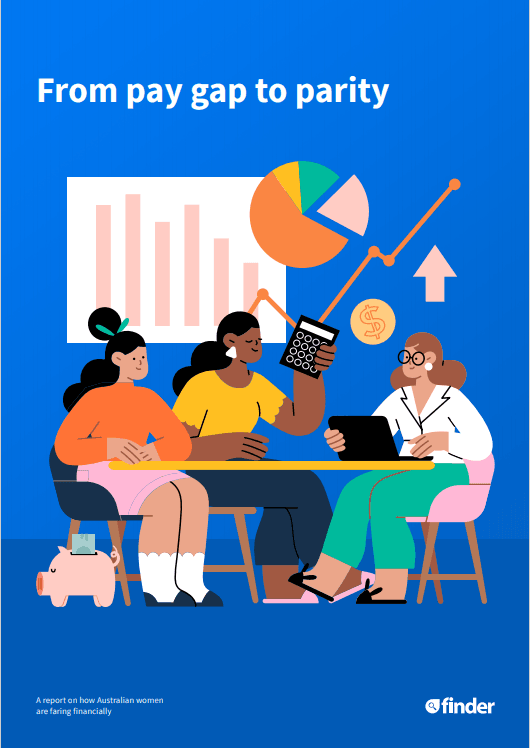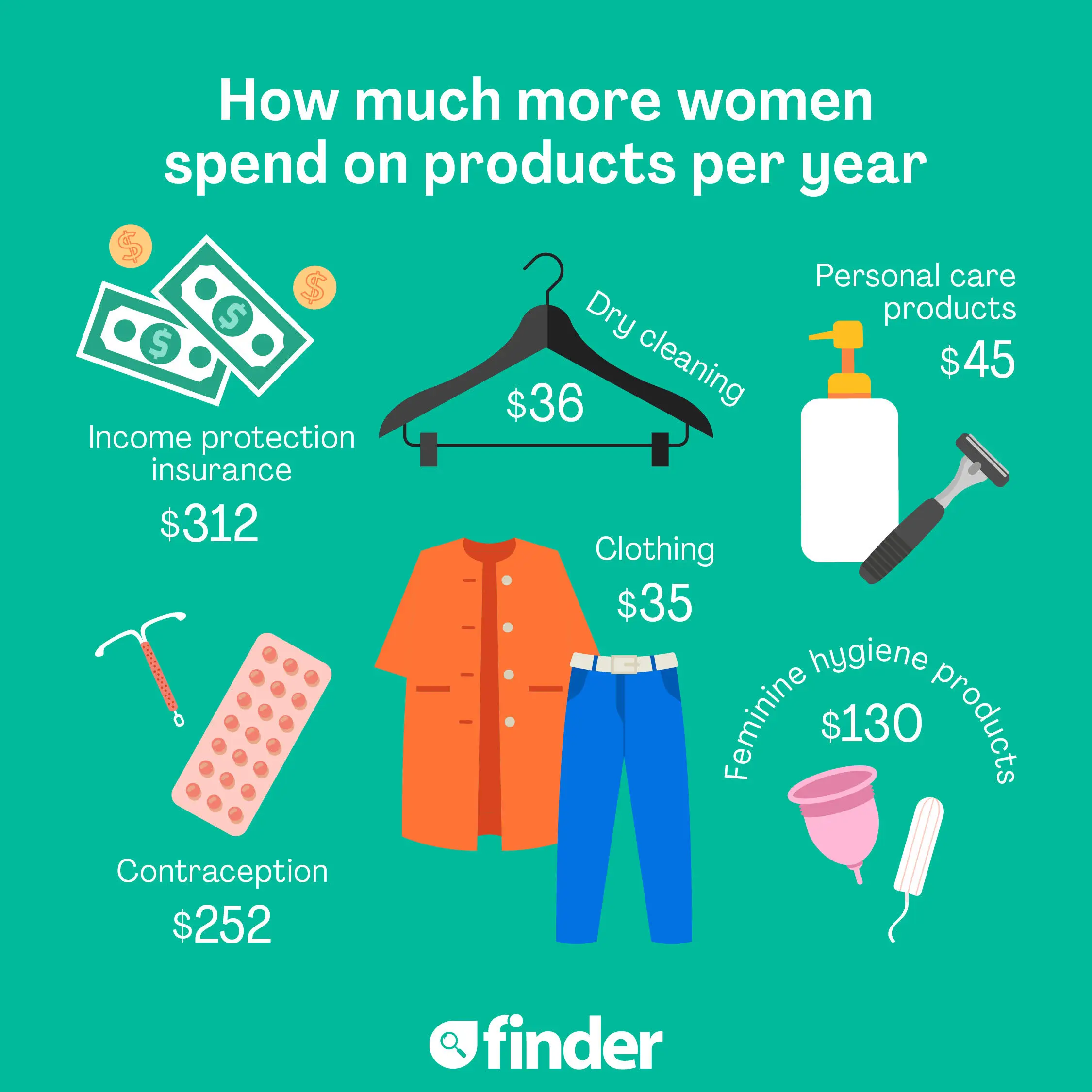International Women’s Day Report
A Finder report on the personal finance gap between men and women
We’re reader-supported and may be paid when you visit links to partner sites. We don’t compare all products in the market, but we’re working on it!
From pay gap to parity
 Gender inequality has become an increasingly debated topic in recent years – and for good reason. While Australia has made strides towards equal wealth distribution, there is still significant work to be done, particularly given how COVID-19 has disproportionately impacted women and their finances.
Gender inequality has become an increasingly debated topic in recent years – and for good reason. While Australia has made strides towards equal wealth distribution, there is still significant work to be done, particularly given how COVID-19 has disproportionately impacted women and their finances.
Our report for International Women's Day, From pay gap to parity explores the ways in which women outperform men when it comes to money as well as the barriers they continue to face. Using data from 21,564 respondents from Finder's Consumer Sentiment Tracker, the report identifies the areas where women remain at a financial disadvantage. It explores the primary drivers for gender inequality in finances, including the pay gap, the "gender premium" on basic goods and services, the disparity in financial literacy and the lack of female investors. Finally, we seek advice from Finder's experts on how to turn things around and help women get ahead when it comes to their money.
Click here to download the full report.
Watch our expert panel discuss the findings
To launch the report, we hosted an all-star virtual panel to discuss the findings in more detail and explore the relationship between gender and personal finances in Australia. Our very own senior home loans editor Sarah Megginson moderated the live YouTube event with Fiona Guthrie (CEO, Financial Counselling Australia), Christina Hobbs (CEO, Verve Super) and Lucy Dean (Women's Wealth Editor, Yahoo Finance).
You can watch the full hour-long discussion below:
Key statistics
| Average man | Average woman | |
|---|---|---|
| Amount in savings | $36,851 | $21,398 |
| Monthly savings | $873 | $600 |
| Amount in super | $154,453 | $122,848 |
| Retiring without super | 13% | 23% |
| Number of credit cards | 1.13 | 0.86 |
| Credit card debt | $8,148 | $5,416 |
| Level of financial stress | 68% | 76% |
| Salary | $79,976 | $56,316 |
| Net wealth | $449,000 | $400,000 |
| Most likely to turn to for investment advice | News/ financial websites | Family and friends |
| Credit score | 778 | 796 |
| Struggle to pay mortgage/rent | 25% | 28% |
Findings
- Women are more responsible with their money when it comes to saving and spending.
- Women have higher average credit scores and are less likely to be rejected for products like credit cards, loans or insurance.
- Female investors get higher investment returns than their male counterparts, but women are less likely to start investing in the first place.
- Women have less in cash savings and superannuation than men and are more likely to retire without super.
- Women are more likely than men to carry some form of debt, particularly when it comes to student loans and buy now pay later.
- Women have less credit card debt than men, but it takes them longer to pay off their debt.
- Financial stress disproportionately impacts women, particularly when it comes to grocery bills and rent or mortgage payments.
Drivers
The gender pay gap
Finder analysis of ABS data found a $23,660 gap in full-time earnings between men and women. Women are also more likely to work part-time or casual jobs or take on domestic and caretaking roles that are not remunerated.
The gender premium
Finder analysis of a range of basic goods and services found women spend $679 more per year on average than men, with income protection insurance and contraception topping the list.
The financial literacy gap
There is a disparity in financial literacy between men (63%) and women (48%), particularly when it comes to superannuation, income protection insurance, personal loans and gas bills.
The investing confidence gap
Women have a lower appetite for risk than men and are more fearful of investment underperformance or hidden fees, which prevents them from investing. Some women also agree the stock market is tailored to men.
COVID-19
Women are more likely to have become unemployed or underemployed as a result of the pandemic. They are more likely to have suffered financially and report higher levels of job insecurity and financial stress due to the recession.

'Better Retirement Outcomes: A snapshot of account balances in Australia', The Association of Superannuation Funds of Australia, July 2019
- 'Average Weekly Earnings Australia', Australian Bureau of Statistics, May 2020
- 'Females closing the gender wealth gap', Roy Morgan, August 2019
- 'State of the Nation Report', Credit Simple, October 2019
More guides on Finder
-
Happiness statistics 2021
Finder research reveals key happiness statistics. Data shows children, financial security and a good Internet connection make Aussies happy.
-
Finder’s RBA Cash Rate Survey: 60% of experts blame BNPL for drop in credit cards
Credit cards are being used less and experts say Buy Now Pay Later services such as Afterpay and Zip are to blame according to the latest Finder RBA Cash Rate Survey results.
-
From pay gap to parity: New report reveals how Australian women fare financially
Australia has come a long way in pursuit of gender equality, but there is still work to do, a new report by financial comparison Finder reveals.
-
9 brands donating to a good cause this International Women’s Day
Want to support women while you shop? Here are 9 brands donating to causes for International Women's day including Afterpay and Bec & Bridge.
-
How women can build their own financial future
Finance expert Lisa Montgomery takes us through five steps women can take towards financial freedom.
-
All the deals you can nab this International Women’s Day
Celebrate International Women's Day this year by treating yourself to a sale or two.
-
Podcast: Superannuation is leaving women behind
An important discussion about the gender gap in Australia's superannuation and retirement system with Future Super's managing director Kirstin Hunter.
-
How do we encourage more women in STEM?
Tech entrepreneur Robyn Foyster looks at the value of encouraging women to explore STEM fields – and how we can unlock more opportunities for them.
-
We must “level the investment playing field” for women: CoreLogic CFO
A quarter of women believe investment information and advice is too intimidating and geared towards men.
-
Intrepid introduces new women-only expeditions for International Women’s Day
Uncover the customs, challenges, food and lives of local women all around the world.
Ask an Expert